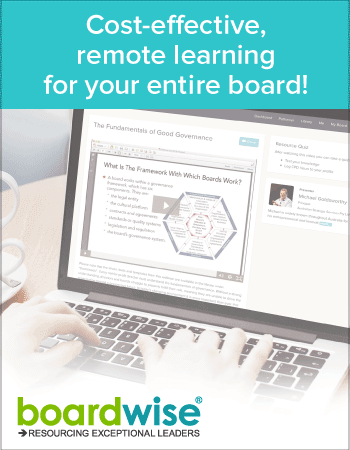governance
Published: January 20, 2025
Read Time: 9 minutes

Jump to Section
As a not-for-profit organisation, forming an advisory board can be a strategic way of gaining access to advice and expertise. Advisory board members bring fresh ideas, new networking opportunities, and partnerships to the table. They can connect the organisation’s board of directors with new avenues in funding, resources and more.
When done right, an advisory board can support the board in making informed decisions and navigating substantial changes. Advisors provide critical knowledge and experience that can help NFPs avoid mistakes and navigate uncertainty. While there are several benefits to having an advisory board, the strategy can also present a few risks and challenges.
Understanding the roles and responsibilities of advisory board members, how they differ from a board of directors, and how to set them up for success, is vital to maximising the social capital of community members and experts.
What Is an Advisory Board?
Also called a steering committee, advisory panel, advisory group, or consultative body, the advisory board is an important part of the organisation’s governance strategy.
An advisory board is a group of experts assembled to implement a collaborative approach to problem solving within an organisation. According to the Advisory Board Center, the main goal of the advisory board is to generate advice and inform decision making.
However, advisory board members often support the organisation with other areas, such as:
- Business growth,
- Succession planning,
- Supporting transitions,
- Managing crisis,
- Solving organisational challenges,
- Expanding into new markets, and
- Providing strategic or technical advice.
Advisory boards tend to be more flexible than a board of directors, offering room for more innovation and creativity. They help the organisation gain insight into internal and external problems and explore fresh solutions and opportunities.
Advisory Board Benefits
Governance Strategist Cindy Dibete says that there are several benefits to forming an advisory board. As a governance strategy, it can provide new insights and expertise that may not be available in the organisation’s board.
According to law firm Russel Reynolds LLC, having access to members who have expertise in relevant topics and areas that pose organisational challenges can help board members stay up-to-date on emerging topics and issues that affect the organisation.
An advisory board provides a shared space for employees, board members, technical or subject matter experts, and community members to discuss specific topics or problems. It offers company board members an in-depth perspective on real-world situations.
Common Challenges & Risks
There are a few risks and challenges to using advisory boards, such as needing to invest money, time, and people away from other projects. Other risks such as poor communication, conflicts of interest, and slow decision making can create challenges for an Not-for-Profit (NFP).
Below are some of the common challenges:
Slow Decision Making
In addition, people on advisory boards may have opposing views on a specific issue, leading to slow decision making and challenges with managing conflicts. Some advisory boards may lack accountability since they are not expected to meet the same legal obligations as boards of directors. Organisations sometimes see advisory boards as taking away their autonomy to make decisions, especially if advisors push for changes that are misaligned with the existing vision of the board, says Dibete. This may create delays or even conflicts.
Bad Communication
Advisory boards can take on a life of their own and operate in a silo. Some advisory boards can also become at odds with the goals of the board of directors if their ideas do not align with the organisation’s mission, purpose, and objectives. Finally, choosing the wrong advisor can lead to bad advice and mediocre performance.
A strong advisory board should have the right combination of knowledge, skills, and competencies to benefit the work of the organisation. Having good communication with the board of directors is key to staying aligned, Neal and Stuart add.
Shadow Directors
Due to their advisory role and participation in discussions about the organisation’s business, advisory board members can be at risk of becoming shadow directors.
Shadow directors that have influence can also create a conflict of interest. Additionally because advisors often lack accountability it can lead to bad decisions or even illegal activities, according to John Price, the Commissioner for the Australian Securities and Investments Commission (ASIC).
Because advisory boards provide advice to the organisation’s board there is a risk of creating shadow directors, especially if their advice to the board is taken as instruction. “Care needs to be taken that advisory board members, by the structure of their office and functions or by the practice of the performance of their role, do not become de facto or shadow directors…,” - Australian Institute for Company Directors (AICD).
Under-Commitment
Legal advisors, PJ Neal and Alix Stuart, say that some advisors may be under-committed to the role due to busy schedules, full time jobs, and other responsibilities.
While advisory boards can be great at generating ideas, advisors may not have experience with the implementation of these projects, requiring organisations to translate their reports into actionable strategies and plans. It is critical to choose advisors with the right kind of expertise and knowledge, and a commitment to actively engaging in the advisory board’s activities.
Advisory Board Roles and Responsibilities
There are three key roles within the advisory board structure: the Chair, the external advisors, and the internal representatives or stakeholders. This structure provides a balance between facilitation, advising, and implementation of recommendations. The Chair is typically responsible for facilitating and planning meetings, evaluating the effectiveness of the board, and mentoring or guiding members.
The role of advisors is to generate and implement new ideas and projects that respond to the needs of organisation. They are chosen for their ability to contribute to strategic discussions and provide guidance on how to adapt to cultural and political shifts in society.
Once selected, the expectation is for advisory board members to share their skills and expertise and contribute to the goals of the group and the NFP. Collaboration is key to providing helpful insights and advice and, at times, advocacy. Advisors should therefore have current knowledge of issues and available resources and solutions, critical thinking abilities, and a willingness to give feedback and analysis as needed.

Check out this webinar available in BoardWise for a great discussion and refresher on sub-committees.
Tips for Running Advisory Boards
Dibete recommends defining objectives from the start and choosing advisory board members carefully, as well as encouraging them to maintain open communication and respectful dialogue.
According to Get Fully Funded, advisory boards can influence how an NFP is perceived in your community, providing legitimacy to new initiatives. The advisory board must clearly define and communicate its expectations, including how long members will be involved, the time commitment expected of advisors, the contributions of each member, the frequency of meetings, and any compensation or benefits offered in return for joining the advisory board.
Setting Up the Board
Advisory boards can be formally set out in the charter (many however are less formal). Their function, accountability and responsibility should designed and written down in a charter or terms of reference that clearly defines the skills and experience expected of members. Advisors should be skilled at adapting and revising their plans since the organisation and its environment may evolve and the needs can change over time.
Sourcing Advisors
Advisors can represent a broad variety of backgrounds and should have a strong understanding of the issues they will be working on. NFPs should aim to source members directly from their community, but also prioritise the right combination of skills, qualities, and experience needed to achieve the organisation’s goals. This may also include professionals such as lawyers, accountants, marketing experts, HR experts, financial advisers, business owners, industry experts, technical experts, information technology experts, or social advocates.
Involving members of the community your organisation serves can give key community stakeholders a voice. For example, a health clinic for people who have recently immigrated can create an advisory panel made up of local businesses, service providers serving immigrant populations, and members of the community to get a sense of the most urgent needs.
Running Board Meetings
Advisors may be responsible for planning the meeting agenda, distributing information to others, running the meeting, participating in discussions, recording decisions, and following up on actions. Minute taking is an important way for advisors to document important discussions and share their progress with the company board and other stakeholders.
What is the difference between an advisory board and a company board of directors?
The difference between a company board of directors and an advisory board is their legal status and responsibilities. Advisory boards are a sounding board for directors and provide expertise not found in the regular board, while boards of directors are legally responsible for the direction and management of the organisation, including its finances.
According to the AICD, advisory boards are not subject to the Corporations Act 2001 and don’t have a recognised legislative mandate. They offer expert knowledge and guidance without getting involved in day-to-day operations or risking liability.
In comparison, company board directors are responsible for overseeing the company's operations and its governance. Board of director members also have legal responsibilities when making decisions over business matters and are subject to legal obligations. To learn more about the duties of board directors, read this Better Boards article.
When does a non-profit need an advisory board?
When an organisation is undergoing expansion, change, or growth, or dealing with a major crisis or business problem, an advisory board can assist in brainstorming ideas and solutions to complex problems. Their guidance can accelerate progress by establishing a larger network of mentors and connections that can support the entity in weathering challenging times.
The primary reasons for forming an advisory board must involve the need to make strategic choices objectively by bringing in outside experience and support for future changes or decisions that will affect the direction of the NFP.
Do advisors get paid for their work?
Whether or not an advisory board member gets paid for their work depends on the organisation and the agreement negotiated. In some cases, an NFP may reimburse the advisor for expenses incurred, while other times, they may choose to pay a flat fee or honorarium for every meeting attended. Another option is to pay advisors a retainer or a small amount of equity as compensation for their service to the board.
Advisory board members can also receive other types of benefits such as expanding their professional network, upgrading their skills and knowledge, or enhancing their credibility within the sector or community, according to the AICD. Some members will set their rates based on the level of expertise and experience they provide and negotiate compensation with the company board during the selection process.
Further Resources
Board Dynamics: Overcoming Miscommunication Among Directors
The Power of Strategic Collaboration
Top Tips for Developing Collaborative Leaders
Stepping Up: Mastering the Role of Chairperson
Share this Article
Recommended Reading
Recommended Viewing
Author
- About
-
Better Boards connects the leaders of Australasian non-profit organisations to the knowledge and networks necessary to grow and develop their leadership skills and build a strong governance framework for their organisation.
Found this article useful or informative?
Join 5,000+ not-for-profit & for-purpose directors receiving the latest insights on governance and leadership.
Receive a free e-book on improving your board decisions when you subscribe.
Unsubscribe anytime. We care about your privacy - read our Privacy Policy .









